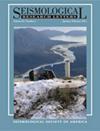Monitoring of Local Earthquakes in Haiti Using Low-Cost, Citizen-Hosted Seismometers and Regional Broadband Stations
IF 2.6
3区 地球科学
Q2 GEOCHEMISTRY & GEOPHYSICS
引用次数: 0
Abstract
Seismic monitoring in Haiti is currently provided by a mixed network of low-cost Raspberry Shake (RS) seismic stations hosted by citizens, and short-period and broadband stations located mainly in neighboring countries. The level of earthquake detection is constantly improving for a better spatio-temporal distribution of seismicity as the number of RS increases. In this article, we analyze the impact of the quality of the signals recorded by the RS—low-cost seismometers with the smallest magnitude that the network can detect by studying the ambient noise level at these stations. Because the RS stations are installed as part of a citizen-science project, their ambient noise estimated by the power spectral density (PSD) method often shows a high-noise level at frequencies above 1 Hz. In the near field (<50 km), we show that the network detects seismic events of local magnitude on the order of 2.2 with signal-to-noise ratios (SNRs) greater than 4. Improving the network detection threshold requires densifying the network with more RS stations in locations that are less noisy, if possible. In spite of these limitations, this mixed network has provided near-field data essential to rapidly understand the mechanism of the mainshock of the 14 August 2021 Mw 7.2 earthquake, to monitor its sequence of aftershocks in near-real time, and to monitor background seismicity in Haiti on a routine basis.使用低成本、公民托管的地震仪和区域宽带站监测海地的局部地震
海地的地震监测目前由公民托管的低成本Raspberry Shake(RS)地震台站以及主要位于邻国的短周期和宽带台站组成的混合网络提供。随着RS数量的增加,地震探测水平不断提高,以获得更好的地震活动时空分布。在这篇文章中,我们通过研究这些台站的环境噪声水平,分析了RS——网络可以检测到的最小震级的低成本地震仪——记录的信号质量的影响。由于RS站是作为公民科学项目的一部分安装的,因此通过功率谱密度(PSD)方法估计的环境噪声通常在1 Hz以上的频率下显示出高噪声水平。在近场(<50km)中,我们发现该网络检测到局部震级为2.2级的地震事件,信噪比(SNR)大于4。如果可能的话,提高网络检测阈值需要在噪声较小的位置使用更多RS站来加密网络。尽管存在这些局限性,但该混合网络提供了近场数据,这些数据对于快速了解2021年8月14日7.2级地震主震的机制、近实时监测其余震序列以及日常监测海地背景地震活动至关重要。
本文章由计算机程序翻译,如有差异,请以英文原文为准。
求助全文
约1分钟内获得全文
求助全文
来源期刊

Seismological Research Letters
地学-地球化学与地球物理
CiteScore
6.60
自引率
12.10%
发文量
239
审稿时长
3 months
期刊介绍:
Information not localized
 求助内容:
求助内容: 应助结果提醒方式:
应助结果提醒方式:


